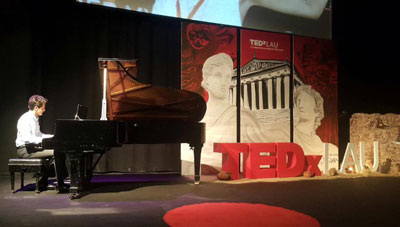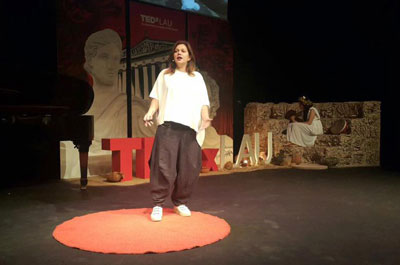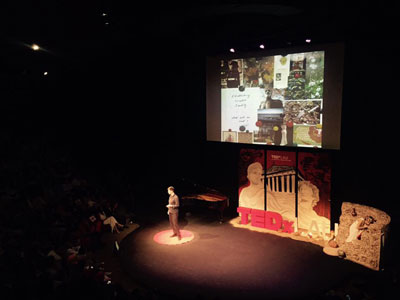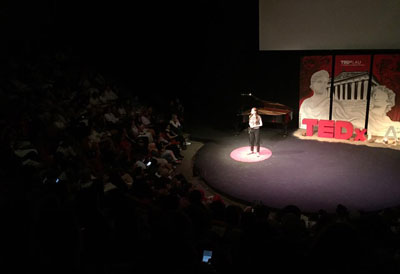Music, passion and unity dominate at TEDxLAU
More than 400 participants gather at the emotionally charged event in LAU Beirut promoting self-healing and solidarity.

Talented Shaun Agostine performs his beautiful compositions, one of which is a thoughtful dedication to former TEDxLAU Speaker, Sara El Khatib.

“Love doesn’t mean being blinded and naive. Love is a political tool. Love gives hope, hope gives power, and power leads to change.” – TEDxLAU 2016 speaker Rana Khoury, on positive political rhetoric and creating a space for love.

Jason Steel: “We are the instigators of change. By giving alternatives to the expected norm, we can influence what men and women wear. When we do this, we also have the chance to influence society.”

“We could create our own heaven and we could create our own hell, why not create a better dream for all of us? Together, we can light the path so our children could finally see the sun.” - Serene Dardari on helping the lost Syrian generation.
A talk about the impact of unnatural sounds, a harmonious trio and the compositions of a talented teenager were among the acoustic delights presented at TEDxLAU this Saturday.
“So many speakers, so many ideas shared, but the time passed so quickly,” said Maya, one of almost 400 attendees.
While LAU English Instructor Deema Dakakni encouraged the audience at the sold-out event to embrace the self-healing power of natural sounds and chanting, sisters Cynthia, Joy and Elsa Saade drove the point home with a distinctive tri-lingual and well-received theatrical a capella performance.
The piano pieces composed and performed by thirteen-year-old Shaun Agostine were equally beautiful, though the first of them, written in four parts to reflect the four lessons Sara Khatib outlined during her talk at TEDxLAU in 2014, brought many to tears. Khatib was a pharmacy student at LAU when she lost her battle with cancer.
Also channeling loss on the stage of the Gulbenkian Theatre was head of LAU’s fashion program Jason Steel. Remembering his father, Steel spoke with raw emotions and intensity about the family he had found in Beirut among his students. “Our program is to help make them who they are and not who others think they should be.”
Narjes Jaafar and Sally Beydoun spoke eloquently of their battle between the expectations of others and of self, sharing their individual experiences with the headscarf as though in conversation with each other. Jaafar had chosen to remove hers after feeling stifled by the way other people perceived her. “I had a voice that wasn’t veiled but was expected to be a voice of the veil,” she explained. Beydoun recounted her experiences with airport security and ignorant prejudice. The two-person format that reflected solidarity and the confidence with which the young women spoke earned them a well-deserved standing ovation.
Aaed Ghanem and Rita Jamijian also took to the stage together to showcase some enviable AcroYoga positions which, explained yogi and therapist Ghanem, are a physical demonstration of trust. A discourse on lying by student Jad Karbala highlighted the care with which the entire schedule of 16 talks ―14 live and two recorded ― had been put together by organizer and English Instructor Reina Azzi and her team of dedicated volunteers.
The most visible of the many volunteers was perhaps the young student who sat, looking beautiful in a Grecian dress, on the faux stone wall that complemented a large mural depicting the theme of the day ― an agora, a large public space in ancient Greece where people congregated.
Serene Dardari’s impassioned plea for solidarity between the Lebanese and the Syrians evoked visions of an orator imploring her countrymen as they gathered in the agora. “The borders between us are invisible lines drawn by very sick people. We cannot survive without each other.”
Also promoting unity was the last speaker of the day Rana Khoury, a founding member of Beirut Madinati who spoke of a youth surrounded by hate. “Hate leads to sadness and anger. People who are sad do not act. Those who are angry lose hope,” said Khoury as she explained the motivation behind the Madinati movement and invited others to join. “We opened the door for change and it cannot be closed again.”
More
Latest Stories
- Into the Psychology of Justice
- Alumnus Zak Kassas on Navigation, Spoofing and the Future of GPS
- Hearing Between the Lines
- LAU Hematology Conference 2025: Advancing Science Through Interdisciplinary Exchange
- Dr. Chaouki T. Abdallah Invested as LAU’s 10th President
- LAU Guides Its Students Through the Code of Conduct
- Innovative Procedure at LAU Medical Center–Rizk Hospital Signals Hope for a Patient With a Congenital Disease
- LAU’s Inaugural PodChat Session Addresses AI Detection in the Classroom

